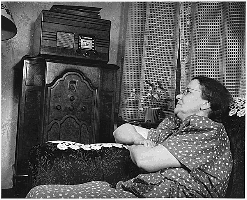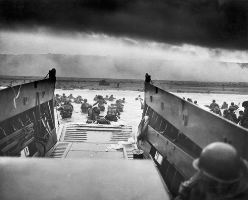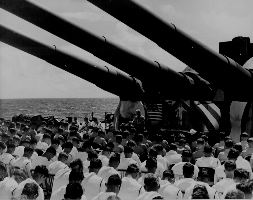Even the poker games paused when the train clack-clacked its way into some new part of 1940's America. All tough-guy pretenses dissolved as this mix of boys and men raced from side to side to see the stunning vistas that would forever be seared into their memories. Gasps greeted the gorges, those thousand-foot drops that made even the paratroopers step away from the windows in height-challenged dizziness.
dissolved as this mix of boys and men raced from side to side to see the stunning vistas that would forever be seared into their memories. Gasps greeted the gorges, those thousand-foot drops that made even the paratroopers step away from the windows in height-challenged dizziness.
Eventually, darkness would end the sight-seeing and the cars would again be filled with the sounds of men and boys heading to war: Snoring, nervous laughter, and the raucous cheers and jeers greeting triumphant shouts of "Full House!" or "Flush beats two of a kind!"
Since leaving California, this batch of troopers watched deserts turn to mountains, and mountains turn to dense Arctic forests, and then the wild would turn back to civilization somewhere shy of Denver. Nearly every soldier was seeing these American treasures for the first time, having never been more than 20 miles from home before the war.
Many were also seeing them for the last time.
 Some wrote letters, their pencils leaping up and down with the bounce of the railcar; others traded tall tales or showed off pictures of their wives and kids. The longer the train ride, the quieter the young ones got. Their thoughts-though they would have denied it to the death-were of things like their mother or their farm, more than a few wishing they'd not been so brave.
Some wrote letters, their pencils leaping up and down with the bounce of the railcar; others traded tall tales or showed off pictures of their wives and kids. The longer the train ride, the quieter the young ones got. Their thoughts-though they would have denied it to the death-were of things like their mother or their farm, more than a few wishing they'd not been so brave.
Among them were 15 year-old farm boys and 16 year-old orphans and 17 year-old rich kids, all of whom had either bamboozled a willing-to-turn-a-blind-eye recruiter or had talked their parents into signing to let them in. Now, trapped on a train headed to Europe with a bunch of men, some old enough to be their father, they suddenly felt like mere boys again.
What they couldn't know is most of the older guys were just as scared, just as uncertain. Some had been to war already, and had seen enough to make them wish the war was over before they got back. Others, the ones who hadn't seen combat, wondered if they had what it took to stand their ground when the shooting started.
Still, despite the frequent stops, and all those times when the train struggled so hard to climb hills that "the boys" could hop off and back on-and more than a few proved it true-almost nobody ever went AWOL from the trains.
So when this train cleared Denver and started its long, long, l-o-n-g trek through the flatlands of eastern Colorado, wheat-covered Kansas and corn-coated Nebraska, the scenery no longer distracted them and the poker games got tiring and the bodies got worn out from the rocking and jerking of the ever-bumpy train. This left every single soul aboard with time to think bigger thoughts, mostly about that worst part of humanity: It's tendency to send the best and brightest from its' youth to right the wrongs of the few dung-heap-elders who couldn't control their basest desires for death and destruction.
Train after train, the story was the same; only the faces were changed. In the nation that founded the assembly line, here was its' finest products: Men (and more women than history would acknowledge until much later) who thought themselves expendable for something bigger than self. Even the inevitable anesthesia of the young, that it-can't-happen-to-me-feeling we all know too well, stopped working somewhere west of Omaha on those rolling trains. Almost no one didn't wonder if this was their last peek at their homeland.
finest products: Men (and more women than history would acknowledge until much later) who thought themselves expendable for something bigger than self. Even the inevitable anesthesia of the young, that it-can't-happen-to-me-feeling we all know too well, stopped working somewhere west of Omaha on those rolling trains. Almost no one didn't wonder if this was their last peek at their homeland.
By now, the buzz was rolling through the cars that something special was coming in Nebraska. Men who'd been down these tracks before added their tales to the stories the conductor told about a canteen in North Platte. "Just you wait," they told the boys, "just you wait."
It didn't matter, by the way, whether they arrived at 5 a.m. or 2 p.m., North Platte, Nebraska was ready for them. Thousands of farm wives and daughters, and hundreds of men too old or too young to be on the trains had all rallied to turn North Platte's water-stop into an oasis, a taste of home before the war. Oh, what a home!
For ten minutes, Lavon Kemper and Rae Wilson and Elaine Wright and all the ladies like them were angels of mercy, mothers to millions whose real moms couldn't be there. They loaded the soldiers up with magazines and cakes and coffee and milk in those glass jugs history would make collectible someday soon, and they laughed and cried and hugged the wounded, all without a thought about the thank-yous that would flood their town even seventy years hence. And they did it when their eggs and sugar and gas and just about everything else they gave "the boys" were rationed down to nothing.
 One day, Lavon Kemper told Bob Greene when he was writing his book, Elaine Wright showed up at the Canteen with a secret heartache none of the boys knew about. Elaine baked cakes and passed them out to the boys, often arbitrarily picking out the youngest or shyest and declaring it his birthday. Then the whole canteen would break into "Happy Birthday", and the world and the war seemed farther away, while mom and the farm seemed closer than ever.
One day, Lavon Kemper told Bob Greene when he was writing his book, Elaine Wright showed up at the Canteen with a secret heartache none of the boys knew about. Elaine baked cakes and passed them out to the boys, often arbitrarily picking out the youngest or shyest and declaring it his birthday. Then the whole canteen would break into "Happy Birthday", and the world and the war seemed farther away, while mom and the farm seemed closer than ever.
What Elaine never told those boys, as Lavon told Bob, is that just a few days earlier, her boy was killed in that war. It apparently never occurred to Elaine to seek sympathy for the loss of her heart of hearts; instead she got up from her grief and tended someone else's son.
from her grief and tended someone else's son.
What a country! What a people! What a big heart!
The boys were just there for ten minutes, but you only have to read their letters-many stored right there in North Platte today-to know those ten minutes were among the most important of their lives.
North Platte and company knew something we still know today, but we drown it out with round-the-clock-crisis-news and nonstop-online-chatter: The same big hearts that passed out cakes and cookies in 1942 still beat in 2k10; it's just harder to find them, see them, hear them.



So at least as much as is humanly possible, we want to avoid the harsh rhetoric and mean-spirited public wrangling that frightens this generation away from quiet moments of introspection on truth and eternity. We want, instead, to make a place where people can stop over in the storms of their lives and find, even for ten minutes, a glimpse of the glory of God's love and man's ability to express it.
We call it being Ten-Minute Christians©, not because it's all the time we have to give, but because the pace of life these days means it's all the time people they have to give us. It means sacrificing stuff we think we need, and tantrums we think we have a right to throw, and attention our own struggles might tempt us to milk, but if we yield to those things, too many people will ride the train of their lives right into eternity without ever glimpsing Canteen Faith; without ever knowing there's a place right now where Jesus reigns, and a place coming up where there's no more of the hard stuff they see and feel and hear every day.



